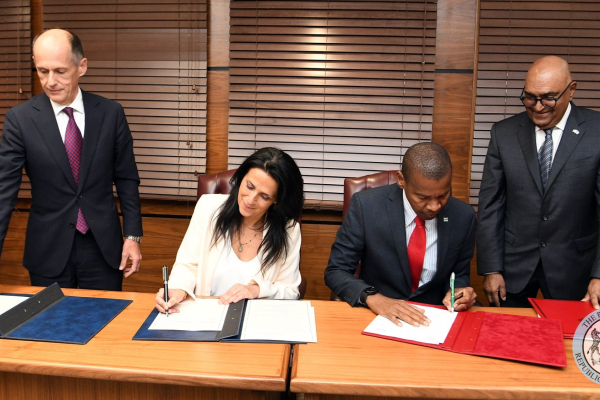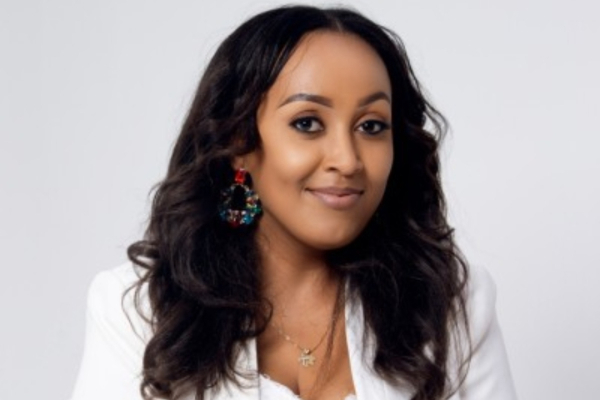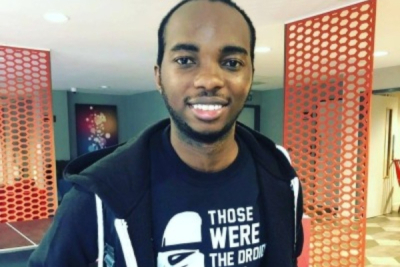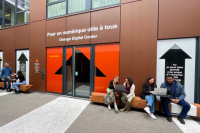On Wednesday 10 April, Botswana's Minister of Foreign Affairs, Lemogang Kwape, and France's Secretary of State for Development and International Partnerships, Chrysoula Zacharopoulou, signed a partnership declaration dubbed the "𝑫𝒆𝒄𝒍𝒂𝒓𝒂𝒕𝒊𝒐𝒏 𝒐𝒇 𝑮𝒂𝒃𝒐𝒓𝒐𝒏𝒆".
The declaration outlines the primary areas of cooperation where Botswana and France aim to bolster their partnership. These areas include digital entrepreneurship, sustainable agriculture, and tourism.
With a solid background in finance and accounting, she decided to focus on e-commerce to meet the needs of Gabonese people for online shopping and fast delivery.
Gabonese auditor and entrepreneur Malika Gadault Deacken (photo), founder of FastBox, has created a platform that connects customers and merchants offering a wide array of products. Established in 2020, FastBox provides an online sales application, FastBox App, which markets a range of items from beauty products to clothing, home accessories, and food.
To enhance customer experience, FastBox has developed an integrated delivery service, FastBox Livraison, allowing customers to receive their purchases at home. This service aims to alleviate the need for physical shopping trips, offering increased convenience to Gabonese consumers.
Beyond her entrepreneurial success, Deacken serves as the Managing Director of Bet241, a Gabonese sports betting company, a position she has held since January 2023. She joined the company in 2017 as the administrative and financial director.
Additionally, Deacken leads the finance committee of Gabon’s TECH 241, a union of technology companies, and mentors with the Women In Africa organization.
Deacken graduated from the Catholic University of Lille in 2009 with a degree in economics and finance. She later earned a master’s degree in auditing, accounting, and management control from ESG Finance in Paris in 2012, and a strategy certification from HEC Paris in 2023.
Before her entrepreneurial journey, Deacken gained valuable experience with major companies such as BforBank, Orange France, and Deloitte. Her tenure at Deloitte from 2013 to 2017, where she held various positions including auditor, senior assistant, and project manager, allowed her to hone her auditing and management skills.
Melchior Koba
A computer scientist by training, he leverages his expertise to benefit South Africans by offering solutions aimed at making education more accessible and effective for every student, whatever their background.
South African computer scientist and entrepreneur Dacod Magagula (photo), a University of Cape Town graduate, co-founded FoondaMate in 2020 with Tao Boyle, after honing his expertise at various companies. FoondaMate, where Magagula serves as CEO, aims to provide accessible, high-quality educational resources to South African students.
The company uses artificial intelligence to develop chatbots for messaging platforms like WhatsApp and Facebook Messenger. The goal is to equip students, especially those without internet access or who have difficulty finding pertinent information, with the necessary tools for academic success.
Magagula’s inspiration for FoondaMate stemmed from his educational struggles. Raised in a resource-scarce rural township in Mpumalanga, South Africa, he fully understands the challenges many students face. “I went to a school in a rural township school in Mpumalanga, South Africa, that didn’t have resources. I did not have electricity at home until I was 7,” he recounted.
FoondaMate, which initially offered downloads of old exam papers, now boasts over a million users who use the service via WhatsApp or Messenger for homework assistance and exam preparation.
Before his entrepreneurial venture, Magagula gained significant web development experience. In 2016, he interned at Lumico, a digital marketing agency, as a web application developer. From 2017 to 2021, he held successive positions as a full stack developer at Monetise E-commerce, an e-commerce agency, and as a full stack engineer at ninety9cents, a South African advertising agency.
Melchior Koba
Algeria is stepping up initiatives to implement its "paperless" strategy to achieve a successful transition to paperless administration by 2029.
The Algerian education sector will undergo a series of digital reforms starting from the 2024-2025 school year, Education Minister Abdelhakim Belabed announced on Monday, April 8, during a working visit to Mostaganem.
“The next school year will mark an unprecedented new digital era, following the complete digitization of all pedagogical, educational, administrative, and organizational operations in the education sector,” Belabed said.
The announced reforms include distance enrolment, particularly for the first year of primary school, set to launch on May 2, as well as guidance mechanisms and other programs to be announced shortly. The aim is to eliminate the need for parents to travel to school.
These reforms align with President Abdelmadjid Tebboune’s instructions to speed up the digitization process in key sectors, including education. In a national address in late December 2023, Tebboune spoke of completing the first phase of the digitization project by mid-2024.
The education sector, which is receiving special attention, will see ongoing digitization in areas such as re-registration, reorientation, and the use of school documents, which will be exclusively available on the Ministry’s digital platform. Additionally, 1,200 new schools will be equipped with electronic tablets.
Samira Njoya
The financial solution was set up by three African tech entrepreneurs to assist African migrants in their transition to life in France.
Moneco, a fintech solution founded by three African tech entrepreneurs Algerian Bilal Dahlab, Beninese Jimmy Kuassi Kumako, and Malagasy Shams Radjabaly was launched in 2022. The France-based startup, which raised approximately $1 million for technology development and growth, allows users to open a euro account, obtain an international VISA payment card, and make transfers throughout Europe or between Moneco users.
The Moneco mobile application, available on iOS and Android, requires users to create an account using a passport and a selfie. A physical address in France is necessary to complete the account creation process. Once the account is set up, users can order a Visa card for payments and other financial transactions. Moneco’s ultimate goal is to serve as a comprehensive financial resource.
The Moneco debit card is priced at €20, with a monthly fee of €1.5. Withdrawals outside France but within the Euro zone also incur a €1.5 fee. Transfers, account maintenance, direct debits, transfers to another Moneco user, card payments within the eurozone, and account opening are all free of charge.
Moneco took part in the Summer 2022 cohort of the Californian accelerator Y Combinator. Since its launch, the Android version of its mobile application has been downloaded over 5,000 times, according to the Play Store.
Adoni Conrad Quenum
With a degree in finance and accounting, he combines his knowledge with technology to provide digital banking services to his customers, contributing to financial inclusion in Africa.
Tanzanian entrepreneur Victor Joseph (photo) is the CEO of Tembo, a startup that offers digital banking services across Africa. Established in 2020, Tembo enables customers to manage their finances, make secure investments, and save, integrating and launching financial products.
Tembo, positioned as a business partner, provides essential technology tools to integrate and launch programmable payment collection, card, wallet, and bank account services across Africa. Its business partners include major players such as fintechs, e-commerce companies, digital banks, mobile money operators, and digital lenders. Licensed by the Central Bank of Tanzania and with other regulatory approvals, the startup aims to expand its influence across East and West Africa.
Its CEO, Joseph, is a graduate of the University of Dar es Salaam with a Bachelor’s degree in Finance and Accounting. He also holds a master’s degree in business strategy and entrepreneurship from Cardiff University, Wales, obtained in 2019.
Prior to founding Tembo, Joseph had already left his mark on the Tanzanian entrepreneurial ecosystem with his previous initiatives. In 2011, he launched Beeble Technologies, a web design and digital marketing agency. In 2015, he founded Tango TV, an on-demand internet streaming media platform. From 2011 to 2018, Joseph successfully led the Universities Entrepreneurship Challenge, an initiative to support and encourage entrepreneurship among African students.
Joseph’s achievements have been recognized, with accolades such as Tango TV’s inclusion among the top 30 emerging technology startups in Africa by Demo Africa in 2015.
Melchior Koba
The digital sector offers a wide range of employment opportunities for young people. By developing the necessary skills, they can seize these opportunities and improve their integration into the labor market.
Orange Digital Center announced on Tuesday, a partnership with Coursera, a leading provider of open online courses. The collaboration aims to equip young individuals in Africa and the Middle East with crucial digital skills, free of charge and at their own pace.
“At Orange, we firmly believe that digital inclusion is the key to creating a fairer and more prosperous future for everyone. In partnership with Coursera and through the Orange Digital Centers, we are opening the doors of certification training to all our beneficiaries, offering educational and professional development opportunities to those who need them most,” said Asma Ennaifer, Executive Director CSR, Orange Digital Centers and Communications, Orange Africa and Middle East.
The partnership will enable young people to acquire knowledge in vital areas such as artificial intelligence, cybersecurity, digital marketing, and entrepreneurship via Coursera, a leading global online platform.
The initiative aligns with Orange’s commitment to equip young talent with the knowledge and skills necessary to enter the job market, advance their professional careers, or inspire them to become digital entrepreneurs. For Coursera, the partnership continues its mission to offer transformative learning experiences to learners worldwide.
The partnership comes at a time when digital skills are increasingly in demand, especially among young people, who make up 60% of all unemployed Africans, according to the World Bank. The training courses provided by the two partners aim to prepare these young individuals for the business world and job market.
Samira Njoya
With a population of over 220 million, Nigeria is the most populous country on the African continent. It is therefore crucial for the government to establish an effective system for the clear identification of its citizens and residents.
IDEMIA Smart Identity, a division of French identity technology firm IDEMIA, announced the renewal of its partnership with the Nigerian National Identity Management Commission (NIMC) on Tuesday. The collaboration aims to upgrade the NIMC’s biometric system, making it one of the most advanced globally, according to IDEMIA. The future biometric matching system will be capable of processing up to one million identity verification searches daily.
“Taking this next step in the enhancement of our system with IDEMIA Smart Identity was a natural choice for us. We wanted to ensure that we deliver the best-in-class solution to our fellow Nigerians, and the pure power of the biometric matching we will receive ensures that the solution is future-proof for our growing population,” said Abisoye Coker-Odusote, CEO of NIMC.
The initiative is part of the Nigeria Digital Identification for Development (ID4D) project, funded by the World Bank since 2020. The project aims to issue digital identities to 148 million citizens by June 30, 2024, a goal that Nigeria appears to be on track to achieve, according to a recent World Bank report.
The partnership renewal follows the government’s recent announcement of the introduction of innovative identity cards with a payment function, powered by AfriGO, a national domestic card system. This will enable all types of social and financial services.
The system upgrade should allow NIMC to provide all Nigerians with access to a secure and reliable identity, enabling them to exercise their rights and responsibilities as citizens. The initial system was designed to handle 100 million entries, but it has now been upgraded to handle around 90 million registrations. This necessitates the extension, which will include 250 million entries to cover the entire Nigerian population.
Samira Njoya
He is passionate about using digital tools to improve various aspects of life, focusing on the field of health. Thanks to his startup, he has won several prizes and awards.
Hamidou Ouologuem (photo), co-founder and CEO of Kénèya Koura, a startup providing digital health services, is committed to enhancing patient care. Established in 2021 by Ouologuem, Fatoumata Diarra, and Oumar Dioni, Kénèya Koura delivers innovative digital solutions to improve healthcare accessibility. The startup’s services include online appointment scheduling, telemedicine consultations, and digital patient record management. It also promotes collaboration between local and international doctors, allowing patients to download their prescriptions online.
In addition to simplifying the patient experience, Kénèya Koura assists doctors in enhancing their organization, visibility, and patient retention. With operations in France, the startup also serves foreign patients.
Ouologuem, a native of Mali, holds a master’s degree in strategic marketing and communication from the École supérieure de commerce du Mali, earned in 2015, and a master’s degree in digital innovation from the Université de télécom in Saint-Etienne, obtained in 2018.
Owing to his dedication and expertise, Ouologuem was accepted into the Orange Digital Center in 2022, where he received financial support, training, and privileged access to Orange services.
With approximately a decade of experience, Ouologuem interned in Orange Mali’s marketing department in 2013. He served as the communications head at Pixel Communication in 2016 and was employed as a web designer by IT company CPG Consulting in 2018. The following year, he joined BCA Expertise, an automotive appraisal firm, as a communications officer.
His achievements have been celebrated with several awards. With Kénèya Koura, he won the Construire le Mali program in 2021. He was also honored as the best e-health startup at the Mali Digital Awards in 2022 and 2023.
Melchior Koba
The 2Africa subsea cable aims to interconnect Europe, Asia and Africa. Its landings in African countries are encouraging partnerships to improve connectivity on the continent.
Authorities in Akwa Ibom State have entered into a partnership with MainOne, a leading West African provider of data centers and connectivity solutions, to construct approximately 140 kilometers of fiber optic infrastructure in the region. The partnership, announced on April 5, aims to provide high-speed connectivity across several regions of southern Nigeria.
This collaboration follows the February landing of the 2Africa cable at Qua Iboe in Akwa Ibom State. The 45,000-kilometre fiber optic submarine cable, part of a consortium led by American company Meta, the parent company of Facebook, Instagram, and WhatsApp, will connect Europe, Asia, and Africa, with a nominal capacity of up to 180 terabits per second.
Abayomi Adebanjo, Regional Director of MainOne, stated at the 2Africa landing that his company is "dedicated to improving Internet capacity and driving various aspects of development, including economic growth, digital transformation, healthcare, security, agriculture and increased state revenue in South-South Nigeria."
In addition to the 2Africa cable, Nigeria is connected to six other cables: Google's Equiano, SAT3, MainOne, Glo1, Africa Coast to Europe (ACE), and West Africa Cable System (WACS). As of February 2024, the Nigerian Communications Commission (NCC) reported that 163.3 million people in Nigeria had Internet access, with 93.4 million having broadband access.
Adoni Conrad Quenum
More...
In 2023, sub-Saharan African countries lost nearly $1.74 billion due to Internet outages and restrictions on access to social networks. Despite these losses, governments continue to use this lever for a variety of reasons.
Voluntary internet blackouts in Sudan, Chad, Senegal, and Comoros resulted in a loss of $39.5 million in the first quarter of 2024, according to data aggregated by Internet Society Pulse.
In Senegal, internet blackouts on February 4-7 and 13 followed the postponement of presidential elections, leading to an estimated loss of $75,523. In Comoros, a blackout from January 17-19, following the re-election of President Azali Assoumani, resulted in a loss of $24,252.
The situation in Chad is more complex, with internet access being cut off since February 28 due to events such as the attempted assassination of Supreme Court President Samir Adam Annour, the assassination of opposition leader Yaya Dillo, and subsequent civil demonstrations. The blackout has already resulted in nearly $2.95 million in losses.
In Sudan, losses are estimated at $36.5 million due to disruptions in internet services amid escalating violence. Internet Society Pulse reports a drop in connections and traffic, with the two main internet service providers, Sudatel and MTN, which hold 53% and 21% of the market share respectively, having completely disappeared.
Additionally, the Amhara region of Ethiopia, home to over 40 million people, has been without internet access since August 3, 2023. This comes in the wake of conflict between the government and the nationalist and irredentist Amhara militia, known as the Fano, formed in the 2010s.
Adoni Conrad Quenum
Since it arrived in Guinea in 2006, Huawei has contributed to the implementation of various digital projects. In the years to come, the government would like to benefit from its expertise once again.
The Republic of Guinea is turning to Huawei for assistance with several digital initiatives. On April 5, Rose Pola Pricemou (photo), the Minister of Posts, Telecommunications, and the Digital Economy, met with a delegation from Huawei in Guinea to discuss potential collaborations aimed at bolstering the nation’s digital infrastructure and fostering technological advancement.
The projects under discussion include training for those involved in computer systems modernization services (SMSI), strengthening the backbone, implementing the Guinea Safe City program, expanding Internet coverage to underserved rural areas, and organizing ICT Girls’ Day on April 25.
These initiatives, for which Guinea is seeking Huawei’s support, form a crucial part of the National Digitisation Strategy’s implementation, which aims to modernize the country’s administration and key sectors. Huawei has been a long-standing partner in this process, having been operational in the country since 2006. The company has spearheaded numerous projects, including the construction of 4,000 km of fiber optic cable, thereby contributing to the development of Guinea’s communications infrastructure.
With recent financial backing of $60 million from the World Bank, the Guinean government is hoping to ramp up its efforts in collaboration with Huawei. The government’s primary digital projects currently include the construction of a digital village, extension of the national fiber optic network, connection to new international fiber optic submarine cables, launch of the public telecommunications company Guinée Télécom, digitization of the administration and various public services, and provision of Internet connectivity to 300 schools and some universities.
Samira Njoya
Following his IT training, tech entrepreneur Ousseynou Diop embarked on a mission to make IT training accessible to those seeking new opportunities. His startup has introduced training programs designed to meet the continent's needs amidst the rapid digital transformation.
Xarala Academy, an e-learning solution developed by a Senegalese startup, offers training in various information and communication technology areas through its web and mobile platforms. The startup, established in 2017 by Ousseynou Diop and based in Pikine, derives its name “xarala” from the Wolof language, meaning “technology”.
"We firmly believe that education has the power to transform - not just individuals, but entire communities and nations. Our vision is rooted in the belief that every African talent trained is one step closer to a better future, where technology is a lever for improving lives," says Ousseynou Diop.
The Xarala Academy mobile application, available on iOS and Android, allows users to access a variety of edtech courses after creating an account. These courses cover areas such as web and mobile development, cybersecurity, design, digital marketing, and project management, typically lasting twelve weeks.
The courses are designed for beginners, with the belief that the twelve-week period is sufficient to acquire the necessary skills in the chosen field. The startup does not require any specific level of education to access its courses, making them accessible to anyone who can read and write.
Xarala Academy, accessible 24/7, has over 6,000 learners on its web and mobile platforms. The Android version of its mobile application has been downloaded more than a thousand times, according to the Play Store.
Adoni Conrad Quenum
E-health provides much-needed services in Africa, particularly by extending healthcare provision to regions where health workers are scarce. However, challenges persist, including the need for better coordination of various initiatives.
The International Committee of Digital Health Experts in Africa (CEISNA) has partnered with the Higher Institute of Public Health in Bamako, Mali, to improve the country’s healthcare systems, according to an announcement made on April 6.
"In a country facing major health challenges, the involvement of the senior management of Mali's Institute of Public Health in this collaboration is not only remarkable but essential. This partnership clearly illustrates Mali's determination to promote the well-being of its population through digital innovation in health," says CEISNA in a press release.
The collaboration will see the implementation of targeted initiatives to strengthen local capacities, expand access to quality care, and leverage modern technology to serve the Malian population better. The partnership also plans to foster a synergy of expertise to stimulate the development of innovative digital health solutions, promote knowledge sharing, and launch projects aimed at transforming healthcare access in Mali.
The partnership aligns with the joint commitment of CEISNA and the Institut Supérieur de Santé Publique de Bamako to enhance Mali’s healthcare systems through digital technology. This comes as Mali is in the process of overhauling its healthcare system, with the National Strategic Plan for Digital Health 2024-2028 approved last December.
The collaboration is expected to herald a new era in the collective effort towards sustainable development and the promotion of public health in Africa, ultimately contributing significantly to the well-being of the people of Mali and the wider region.
Samira Njoya















